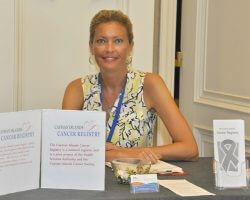 Q&A with Amanda Nicholson, Cancer Registrar, Cayman Islands Health Services Authority:
Q&A with Amanda Nicholson, Cancer Registrar, Cayman Islands Health Services Authority:
What is the Cayman Islands Cancer Registry and why does it exist?
The Cancer Registry is a confidential health registry which aims to capture as many cancer cases as possible diagnosed in the Cayman Islands. Any information collected is securely stored and never shared with outside parties. The data collected is largely demographic, and registering only takes a few minutes. Our goal is to better understand what cancer trends look like so that we can do everything possible to prevent it.
Why is it important for someone to register for the cancer registry (why does it help the community)?
Cayman is a very diverse community with over 135 different nationalities represented. Because of the ethnic diversity, it is important that we have data that is specific to our unique population. Without a basic understanding of cancer trends within the community, it becomes difficult for researchers and medical professionals to plan for cancer prevention and management. When people register it gives us a clearer picture of what needs to be done to manage this disease.
Please share some breast cancer statistics
Breast cancer has been the most reported cancer for as long as the Registry has been capturing data. Approximately 35% of reported cancer cases are breast cancer. The majority of reported breast cancers were diagnosed in patients ages 40-49. The most common type of breast cancer reported is infiltrating ductal carcinoma (also called invasive ductal carcinoma). It is important to note that 65% of registrants are female. This may, in part, be why we have such a large number of breast cancer cases in the Registry.
 How many people are registered on the cancer registry?
How many people are registered on the cancer registry?
We have nearly 800 registrants.
Anything else you’d like to share?
Anyone wishing to register, or wanting to learn about the Registry, may contact me at 244-2560 or at . Registering is fast and confidential.
An interesting fact about you?
I have served as the Cancer Registrar at the Health Services Authority for ten years. Prior to working at the HSA, I was employed as a statistician at Washington University School of Medicine and the University of South Florida.